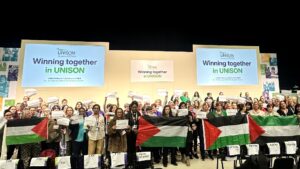UNISON is extremely concerned at recent reports that Lord Walney, the government’s independent adviser on political violence and disruption, has proposed that MPs, councillors and Labour-affiliated unions cut ties and no longer engage with the Palestine Solidarity Campaign.
UNISON completely opposes these proposals and limits on the right to peaceful protest, and urges the government and opposition parties to reject them.
The Palestine Solidarity Campaign does not support protests outside the homes of elected representatives.
UNISON defends the right to peaceful protest outside MPs offices, town halls and Parliament. It also upholds the right of MPs and their staff to work without fear of intimidation or harassment.
UNISON was one of the first UK unions to demand a ceasefire in Gaza. It has also repeatedly called for full access to humanitarian assistance, the immediate and safe release of hostages and an end to the blockade of Gaza.
The union has encouraged branches and members to participate in peaceful protests in support of these demands and appealed for support for the emergency medical response in both Palestine and Israel.
The situation in Palestine and Israel has always been an international priority for UNISON and the union has consistently called for an end to the occupation and for a viable, contiguous Palestinian state alongside Israel.
UNISON condemns the appalling rise in antisemitism and Islamophobia seen in recent months.
The article Proposals that seek to limit the right to peaceful protest must be rejected, says UNISON first appeared on the UNISON National site.
